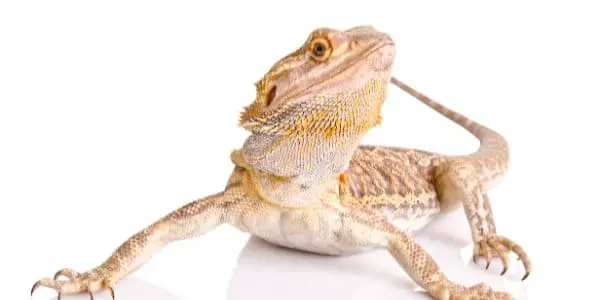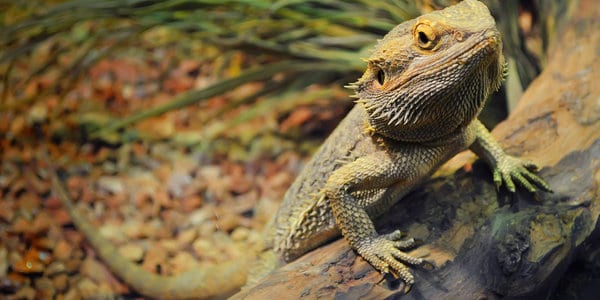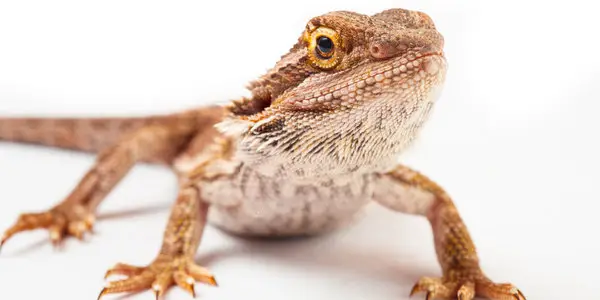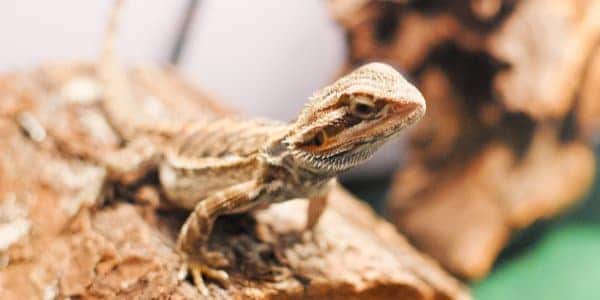If your bearded dragon is angry or unhappy, they will show you by hissing, puffing, glass surfing, or even biting. They may get angry because of noise, problems with their enclosure, other pets, or hunger. By resolving these issues, you will be able to calm them down.
This guide will take a look at the common causes of why bearded dragons get angry and how to calm an aggressive beardie.
How To Tell if Your Bearded Dragon Is Angry?
As mentioned, an angry bearded dragon may puff up, hiss, bite, or even glass surf in an attempt to escape their enclosure. While these can also be signs of other issues, keep an eye out for strange behavior to help determine whether or not something is wrong.
An angry bearded dragon will show you many signs that they are unhappy. So, monitoring your pet’s behavior is important to prevent them from getting and staying angry. Let’s take a closer look at some of these behaviors to keep an eye out for.
1. Biting
Bearded dragons can bite when they are unhappy with how they are handled. The bearded dragon will rarely bite unless it feels threatened and is unable to escape.
In the wild, beardies will only bite as a last resort.
If you notice that your beardie is angry, avoid handling them and use gardening gloves if you must.
Adult bearded dragons can cause severe injuries as they have strong jaws, and you should seek immediate medical attention if your beardie ends up biting you.
Furthermore, biting can be a sign of anger for many different reasons. Sometimes your bearded dragon may bite you if they simply don’t want to be held.
They can also bite you if they are hungry or generally in a bad mood. So, biting may not always mean anger, but it can be a sign that something is wrong.
2. Hissing
When cornered, bearded dragons will produce a hissing sound as they attempt to scare off predators. If your bearded dragon starts hissing at you, it’s an indication that it’s threatened or feeling uncomfortable.
The hissing fit is often accompanied by a flared beard and an open mouth. (Read This Full Guide About Why Do Bearded Dragons Hiss and Make Other Sounds?)
3. Puffing Up
Bearded dragons will puff up to look more intimidating and show their anger or irritation. They do this by expanding their beard to look larger and more intimidating. During this process, you may also notice that their beards turn black. Both are signs of an unhappy bearded dragon.
4. Glass Surfing
Glass surfing is another sign that your pet may be angry. You can recognize this behavior as your bearded dragon trying to escape their enclosure.
They will run back and forth in front of the glass and attempt to climb out by scratching the glass. By doing this, your bearded dragon is showing frustration either with their enclosure or with something else.
5. Fluffing The Beard
When a bearded dragon feels scared, it will try to make its body look bigger by fluffing its beard. This helps them scare off predators in the wild. Bearding also involves stretching to make it look bigger.
6. Gaping
Bearded dragons often open their mouth wide when angry, and you can even see the back of the mouth. Gaping is often accompanied by hissing in an attempt to scare off predators.
7. Head Bobbing
Head bobbing is common when a bearded dragon feels intimidated. This is often a territorial aggression sign. Head bobbing can also occur when a beardie sees its reflection in the glass.
14 Reasons Why Do Bearded Dragons Get Angry + Solutions
Your bearded dragon may be angry because they are unhappy with their enclosure, bothered by too much noise, or not a fan of other animals in the home. They may also not like the amount of sound, or they may be too warm or even hungry.
It can be difficult to diagnose what is making our pets angry since we can’t simply ask. So, you may have to use the process of elimination to determine why your bearded dragon is unhappy. Let’s talk about some common reasons that they may be angry.
1. Sickness
Your bearded dragon can show signs of anger as a way of letting you know that they are sick. There are other signs of sickness to watch out for, like loss of appetite, weight loss, lethargy, and difficulty breathing. However, if your bearded dragon is not feeling well, they may exhibit signs of being angry.
2. Enclosure
If your bearded dragon shows signs of anger, it may be due to an issue with their enclosure. If you have recently set up their enclosure, you may want to reconsider the setup.
If they don’t have proper heating in their enclosure, your pet will not be happy. We all know keeping your bearded dragon warm is important, but you can overdo it.
Getting the enclosure too hot can upset your bearded dragon and cause them to try and escape. Since they are from warm climates, monitoring their heat in the enclosure may not seem important, but it is vital. So, monitor how hot the enclosure is getting if your pet is showing signs of anger.
If you have had your bearded dragon for a while and they are used to their enclosure, they may get angry if you change it up.
So, monitor your pet’s behavior after making changes to their enclosure to ensure they don’t get upset. Remember that something as simple as the layout of their enclosure can make your bearded dragon angry.
The best solution to the aggressive attitude involves providing hides and tunnels in the enclosure where the beardie can easily fit in and feel safe instead of using aggression which is their last resort when cornered.
3. Other Pets
Bearded dragons can get along well with other pets as long as you do not force them to be in the same enclosure. They tend to be very territorial.
So, having more than one bearded dragon in the same enclosure is a bad idea. This is especially common for males. So, two females in the same enclosure may work better.
Bearded dragons tend to get along with cats and dogs as long as you limit their exposure. They can also be affectionate to humans and other pets.
They tend to be unhappy or aggressive only when other bearded dragons are present. So, keep them solo with their own species, but other pets should be fine.
If you got another bearded dragon and it is showing signs of anger, this is common. Most likely, they see each other as threats and invasive.
So, consider this before adding another bearded dragon to the household. If you do get another one, make sure they have separate enclosures, so they don’t get territorial in their space.
The only solution to this form of aggressiveness is to get separate tank setups for each bearded dragon and separate them. Beardies should be allowed to live alone just like they do out in the wild.
4. Shedding
During shedding, the bearded dragon’s skin may get irritated, which often makes them angry and aggressive to everyone. The shedding process allows the bearded dragon to replace damaged skin.
Beardies shed a lot during their young age as the skin needs to keep up with the rapid body growth; however, this process slows down to twice per year in adults. Some beardies can take up to three weeks to shed.
You can help your beardie to shed faster, which will get them to calm down. Start by misting your bearded dragon to keep the outer skin moist.
You can also give them more baths and provide substrate, branches, and rocks for your beardie to rub against and shed the old skin naturally.
It’s also critical to provide quality UVB lighting during the shedding period to ease the process, making the beardie less aggressive.

5. Mating Season
During the mating season, bearded dragons often become temperamental, especially if there are other beardies within the vicinity.
The hormonal changes associated with the mating season can make beardies angry for no apparent reason and even try to dominate their owner.
The Mating season is thankfully short, and the best thing you can do for your beardie is giving them space until the heightened hormones return to normal.
If your beardie is still acting up after two weeks, you should contact the vet.
6. Overhandling
For the most part, bearded dragons are docile pets that you can cuddle and handle all day, but they will get aggressive when overhandled.
Beardies prefer some alone time, especially after meals when they need to bask to raise their internal heat for the digestion process to take place properly.
When interrupted, they will often become angry as they try to crow back to their basking spot.
Overexcited children can also mishandle the dragon scaring them, and they will become frustrated when passed around.
The only way to avoid this aggressive response is to learn what your beardie wants and when they need to be left alone.
7. Noise
Bearded dragons are very sensitive to sound. Sometimes you may be doing something that is too loud for your pet. If they are showing signs of anger, consider how loud their surroundings are.
If you notice that there are loud noises that may be too much for them to handle, consider moving their enclosure or trying to control the sound level.
8. Hunger
Another reason your bearded dragon may be upset could be due to hunger. If they are hungry, they may become angry and bite you. So, ensure they have the proper amount and access to food to help with anger.
They may show aggressive behavior if you do not give your bearded dragon enough food every day. No one likes to feel hungry, and it is common for pets to become angry if their owners do not feed them well.
So, signs of anger may mean they aren’t eating enough. Consider feeding them more to see if that helps with anger, but be careful not to overfeed them.
9. Toys
Bearded dragons are pretty sensitive to changes in their enclosure, and they will often respond to new toys and ornaments with aggression.
This is because they often mistake the ornaments for predators, an adaptation that helps them survive out in the wild.
The Best solution is to remove the new toy or ornament from the beardie’s vicinity, and they will drop the aggressive attitude.
Over time you can try reintroducing the toy or a different ornament and evaluate the beardie’s response.
10. Other Household Pets
Bearded dragons will often feel uncomfortable around other household pets. This behavior can change to aggression if the bearded dragon has no hiding places, they get intimidated by other large and strong animals that look like predators.
This is likely to happen when other pets wander into or near the beardie’s enclosure forcing it to get territorial.
The only solution to this is to keep the beardie in its enclosure and slowly, over time, introduce them to the other pets (if necessary) and ensure that they only interact under supervision.
11. Untamed Bearded Dragons
Bearded dragons that show signs of being aggressive to their owners are likely to be from the wild and thus are untamed.
Depending on where you adopted your bearded dragons from, human contact may feel unnatural for them and therefore see you as a threat.
The best solution is to give the beardie some time to get close to you for bonding and to identify you as the source of food and care. Follow these steps to get your dragon used to you.
- Step 1: Feed insects to your bearded dragon using tweezers every day severally during the first week. The goal is to get them identify you as a source of tasty food and not a threat.
- Step 2: Hand-feed with tweezers for a second week but this time let your dragon take the insect off the tweezers as you stroke part their back gently.
- Step 3: Continue hand feeding with tweezers for the third week. The goal at this time is to continue letting the bearded dragon take the insects as you gently stroke its back for a more extended period. If the dragon looks relaxed after mealtime, try and stroke them without the food present.
- Step 4: If the beardie is comfortable with your contact and trusts you enough try handling them without food and hopefully, by this time they will let you handle them as the trust has been built up over a period of weeks. Keep in mind that you should allow your dragon time to process the change.
12. Being Near the Window
Bearded dragons are different when it comes to window views. Some love the view because they can watch what’s going on outside at the blue sky and white clouds on a beautiful summer’s day.
However, some would rather not be near any windows for fear of predators. Due to their superb sight, dragons can easily spot predatory birds flying past the window which can threaten them, leading to emotions of fear and sudden bouts of anger.
Keep in mind that pets like cats, dogs or even people walking their dogs could easily be disguised for predators.
Although bearded dragons usually get intimidated, they can get defensive for it in certain circumstances instead of being submissive.
The first thing you should do if this happens is to ensure your bearded dragon tank has lots of hides so they can hide when they feel vulnerable, and have somewhere to escape to.
So, get your dragon several hide places to ensure your dragon feels safe.
The second solution is quite straightforward. You just have to move the tank away from the window and see if your pet stops the aggression.
If it doesn’t stop, you need to look for other stressors in the environment.

13. Hot Temperatures
Like any other living creature, Bearded Dragons get angry and even moody when it is too hot, and they can cool down the temperatures in their bodies.
While there is a need to keep them in hot temperatures in the tank so they can stay healthy, it’s also essential to provide them with a cool side so they can cool down and relax.
Bearded Dragons can actually get angry and irritable if they cannot regulate their body temperature efficiently.
The proper temperatures for your dragon basking area are 95 – 100 degrees. Cool spot 75 -80 degrees and the night 70 – 75 degrees. It’s really important that you get the temperatures in the tank correct.
14. Injury or Pain
No animal likes to be in pain, and if your dragon is ill or has an injury, then it is a reason for them to be angry.
The pain could be due to an infection, constipation, injury to a claw, or injury to the body or tail.
The pet might seem ok, but they lash out if you try to pick them up or cuddle them. It might be because of the pain they are feeling.
You should watch their movements and general behavior, check their body for any cuts or foreign objects, and see if you notice anything that looks unusual.
If you are concerned that they are injured or in pain in any way, then you should consult your vet for a check-up.
How to Calm an Aggressive Bearded Dragon?
1. Use a Mild Tone
Bearded dragons have excellent hearing, and they may get spooked if they hear loud sounds.
When around a frightened or intimidated dragon, use a pleasant tone, and they will overcome their fear and even advance towards you without an aggressive attitude.
2. Separate The Bearded Dragons
If you have multiple bearded dragons, you should consider getting a separate tank for each to avoid bullying in the common enclosure.
Keeping bearded dragons separated is the only way to get them to cool down, especially when they get territorial with each other and other household pets.
3. Provide Food Daily
When bearded dragons are hungry, they tend to become aggressive, an adaptation that allows them to hunt down food in the wild.
Having irregular meal times can destress your beardie, so you should feed them on a regular schedule every day and make sure that you remove uneaten food from the cage after the meal.
4. Regular Warm Baths
Giving your beardie a warm bath will hydrate them and clean away any shedding that might be stuck around the joints, a common cause of irritation among beardies.
To soothe the beardie, the water should be between 85 and 92 degrees F. After a 10-minute bath, the beardie will be less aggressive and want to lie down and bask.
5. Get Them Acclimatized to Your Scent.
Beardies often get overwhelmed when relocated to a different enclosure or home and new owners. The best you can do is get your beardie used to your scent so that they are comfortable around you.
This will rescue the aggressive behavior. You can get this done by introducing a T-shirt with your scent in the enclosure so that they become acclimatized to your scent.
6. Reduce Sensory Overload
Bearded dragons have excellent hearing capabilities, and they often get overstimulated by excessive noise in the surrounding areas.
This can scare the beardie and make them angry. Start by reducing noise output from tech devices nearby or even covering the tank when there are spectators around.
7. Minimize Handling
After spending some time with you, the bearded dragon will prefer to be left alone. Otherwise, they become angry when overhandled.
Let your pet dictate when they want to come to you and avoid handing them to their people if they appear to be afraid.
Do Bearded Dragons Turn Black When They Get Angry?
Bearded dragons evolved to inflate their beards when angry, which often makes their heads turn black. This blackish hue gradually wears off when the beardie no longer feels spooked.
If you notice that your beardie has a darkish hue on its head, just let them cool it off, as attempting to handle them will only result in bites and scratches.
How Do Bearded Dragons Show Dominance?
Bearded dragons show dominance by bobbing their heads and inflating their beards as a sign of territorial aggression.
The dominance is won depending on the speed and how threatening the opponent looks until the submitted beardie bobs its beard slowly in submission.
Bearded dragons will also lie on top of each other as a sign of dominance. Tail twitching and gaping mouths are also common signs of dominance among bearded dragons.
Why Is My Beardie Angry for No Reason?
Bearded dragons can develop a strong sense of fear of other households, often making them angry for no apparent reason if they are living in a home with multiple pets.

FAQs
Are Bearded Dragons Aggressive While Shedding?
Yes, shedding can get them pretty aggressive as its a stressful experience to them. They may become uncomfortable and loss their appetite. Once shedding is done, they return to their normal behavior.
What do I do if My Bearded Dragon is Angry?
Increase food intake to avoid making it hungry. Separate enclosures if you have another bearded dragon. A warm bath may help calm down your beardie. Take it to a vet if you suspect your dragon is sick.
Why is My Bearded Dragon Aggressive All of a Sudden?
It can happen due to different reasons such as feeling stressed, hormonal changes, breeding season, health problems.
How Can You Tell a Bearded Dragon is Stressed?
Stress marks, loss of appetite, aggressive behavior, glass surfing, not moving as usual.
How To Destress a Bearded Dragon?
Eliminate any underlying reason behind their destress. Provide them food on regular basis, wash them with warm baths, limit handling them when they are destress. Keep a bearded dragon alone in the enclosure. Decrease loud noises.
How To Handle an Aggressive Bearded Dragon?
Give them a warm bath to calm down. Feed them by your hand. Try to minimize handling them at this period as they prefer to be alone. Use a mild tone when you are with them.
Why Do Bearded Dragons Beard Stretching?
Bearded dragons beard stretching can be due to different reasons. This can be a sign of shedding, showing dominance, basking, excitement, and it can be that they are showing that they are aggressive.
Do Bearded Dragons Hide When They Shed?
Yes, its normal for bearded dragons to hide when they are shedding. Therefore, don’t worry if your beardie start to hide suddenly as it might be shedding. Make sure to provide hiding areas in their enclosure.
How To Tell If Your Bearded Dragon Trusts You?
- They come to you.
- They climb on you
- They don’t show any aggressive behavior when you handle them
- They are waving.
- They eat, sleep and poop normally.
What Do Bearded Dragons Do When They Feel Threatened?
Bearded dragons start to hiss when they feel threatened. Check this post here about 10 reasons why bearded dragons hiss and how to stop them from hissing.

Wrap Up
As a bearded dragon owner, it’s crucial to know when and why your pet reptile is stressed out. For the most part, these docile creatures don’t respond in anger unless they are cornered and can’t find an escape or hideout. If you see any other drastic changes in their behavior, you should visit the vet.
